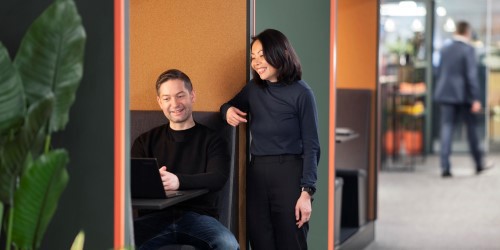Countries
Why a ‘fit in’ culture isn’t good for business
Statkraft’s Head of Human Resources, Siri Langangen, reflects on the biases we all have and what it will take to break them – and why diversity and inclusion are essential to doing business.

What is Statkraft’s ambition when it comes to diversity and inclusion?
Siri: We want Statkraft to be a diverse and inclusive workplace where everyone has equal opportunity to contribute and realise their full potential. That’s why we have set clear goals when it comes to gender balance in leadership and inclusion across our company. Our ambition is to create a work environment in which everyone can be themselves at work. You shouldn’t have to hide who you are. You should feel comfortable speaking up and sharing your views. And we shouldn’t have to worry about fitting in. We take this seriously in Statkraft, and we are measuring our progress twice yearly.
What is Statkraft doing to meet its diversity and inclusion targets?
Siri: We are approaching this from several dimensions. We are creating a governance structure so that at all levels, we understand our responsibility. We are raising competence by educating our leaders and employees on the topic of inclusion and biases, so that everyone understands what we are talking about and why it’s important. We need to be crystal clear on the ‘why’ part, answering why we are talking about this and why it’s good for our people and our business.
Is it up to leaders to build a more inclusive workplace?
Siri: On our inclusion journey, we need to create an environment for sharing and discussing inclusion. Leaders play an important role to be sure, and they need to know what’s expected of them. But we also need to hear from everyone, at all levels, so that we can learn from our experiences and help each other out. We’re in this together.

The theme of this year’s International Women’s Day is “Break the Bias”. What’s your advice to people who want to break their own biases?
Siri: First, we need to be curious about own biases. This means understanding them and making yourself aware of them…because we all have them. Once we are aware of the biases we have, we can reflect on how they impact our decision-making. This awareness may lead to changes in how you behave and treat others.
Have you experienced this yourself?
Siri: Yes, I have taken tests on my own biases and I’m always so surprised. It’s a very good reminder, which is why we are now introducing these types of inclusion activities in Statkraft. I have two sons and two daughters, and I’ve experienced that being aware of my own biases really helps me to make sure that I’m treating my children equally and acting in a fair way.
What are the barriers that companies may encounter on their own diversity and inclusion journeys?
Siri: I think one of the main barriers that companies may face is combatting the ‘fit in’ culture. This is quite common, as we often expect new people to conform to the status quo. This is a barrier we need to break, as ‘fitting in’ ignores the potential of having someone new or different in the mix. This expectation is something that we need to stop.
What is the value of investing in diversity and inclusion at work?
Siri: The main value is through the opportunities that will arise from new ideas, new learnings, and new ways of thinking. Change is happening at an unprecedented rate all around us, and if we don’t learn to adapt and embrace new ways of thinking and doing, we will be left behind. That means that we can’t do things as we’ve always done them. We need to be open, be curious and embrace our differences. Because it’s through those differences that we can uncover value for both ourselves and the company.
Statkraft stats
- 30 % of management positions are currently held by women
- Our goal is to reach 40% in the coming years.
- We aim to build awareness and understanding among 100% of our employees through initiatives such as unconscious bias training, leadership development and regular diversity and inclusion engagement across the organisation.

Employment and diversity
Our people are our greatest asset. That's why we work to ensure a working environment characterised by equality, diversity, inclusiveness and mutual respect for our 4,500 employees.
Read more

Power a brighter future
As Europe‘s leading renewable energy producer and one of the largest energy players in Europe we‘re constantly looking for passionate and bright minds to help us achieve our vision to renew the way ...
Read more

Top legal brain bets on diversity in Peru
Statkraft Peru’s Head of Legal and External Communications, Veronica Arbulu, believes that greater diversity and inclusion are necessary for success in Peru’s energy sector.
Read more





















